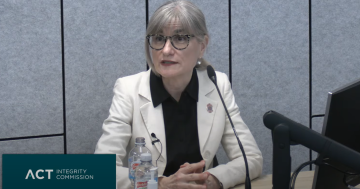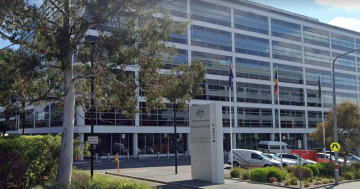
The ACT Integrity Commission has long been asking for phone tap powers. Photo: Claire Fenwicke.
The ACT’s anti-corruption watchdog still doesn’t have the power to intercept your phone calls, but it’s something the government is continuing to support.
The ACT Integrity Commissioner has wanted telecommunications interception (or phone tap) powers for years, but the agency is still awaiting the Commonwealth Attorney-General’s decision to grant it a temporary declaration as a criminal law enforcement agency to do so.
That’s according to the government’s response (released 3 June) to the Integrity Commission Act 2018 review, which made 66 recommendations.
“The government understands that the Commonwealth is continuing to progress consideration of declaring the Commission as a criminal law enforcement agency on a temporary basis under the TIA Act [Telecommunications (Interception and Access) Act 1979],” the response noted.
“The government will await the Commonwealth Attorney-General’s decision.”
The ACT Government also supports the Commission being declared a criminal law enforcement agency permanently.
If this were to happen, a public interest monitor would also be appointed to oversee the process of applying for a telecommunication interception warrant.
Other changes to the Commission’s investigation powers under consideration include requiring anyone who is the subject of a search warrant to comply with a “reasonable request” to hand over any items on their person or remove clothing such as a coat; and allow the Commission to apply for an arrest warrant if it looks like a witness intends to leave the ACT or not attend a hearing or produce evidence.
However, these changes won’t be fully investigated until the next term of the Legislative Assembly (ie, after this year’s election).
Among the lengthy recommendations are also a number of “quick-win amendments” expected to be introduced before the government goes into caretaker mode.
This includes making employment with the Commission more accessible to former ACT public servants.
When the Commission was first established five years ago, it passed the Legislative Assembly with a caveat from the Canberra Liberals that people who had been public servants within the previous five years couldn’t work there.
The ACT Government has agreed that this requirement should be abolished, stating there were “several benefits” to easing this restriction.
“This includes enabling the Commission to obtain first-hand corporate knowledge of ACT public sector practices and processes and expanding the pool of eligible candidates that the Commission may select from,” the response noted.
An ACT Government spokesperson said this could also help with recruitment issues at the agency.
“The Commission has consistently raised that in a small jurisdiction such as the ACT, this rule has significantly limited the number of qualified individuals able to apply for Commission roles,” they said.
Other recommendations to be accepted in the first tranche of amendments to the Integrity Commission Act 2018 to be introduced before the end of September include publishing a witness wellbeing policy and an amendment to restrict the publishing of information in an annual report that could “jeopardise” an investigation.
Given there are 66 recommendations, there are others the government is looking to consult on further in the next term.
This includes changing the Commission’s duties so that it’s required to only investigate matters that could constitute “serious corrupt conduct or systemic corrupt conduct”.
However, the Commission would still continue to investigate any suspected corrupt conduct alleged to have been committed by a Member of the Legislative Assembly, and it could continue to hold preliminary inquiries on any corruption report.
Ensuring witness wellbeing will also be considered further, as many changes could have a “significant budgetary impact”.
This includes making independent psychological support available to witnesses and more information available to witnesses when they’re issued with an examination summons.
The government also released a preliminary response to the Public Interest Disclosure Act 2012 review, which made a number of recommendations that would “substantially amend the public interest disclosure framework”.
All 39 recommendations have been ‘noted’ at this stage as the government expressed its wish to consider them as a “package”.
“As the term of the 10th Legislative Assembly is fast drawing to a close, the government considers it is more appropriate to provide a more detailed and considered response [in the next term],” it noted.
Responsibility for public interest disclosures was previously moved from the Public Sector Standards Commission (and associated areas) to the Integrity Commissioner in 2020.
Original Article published by Claire Fenwicke on Riotact.










